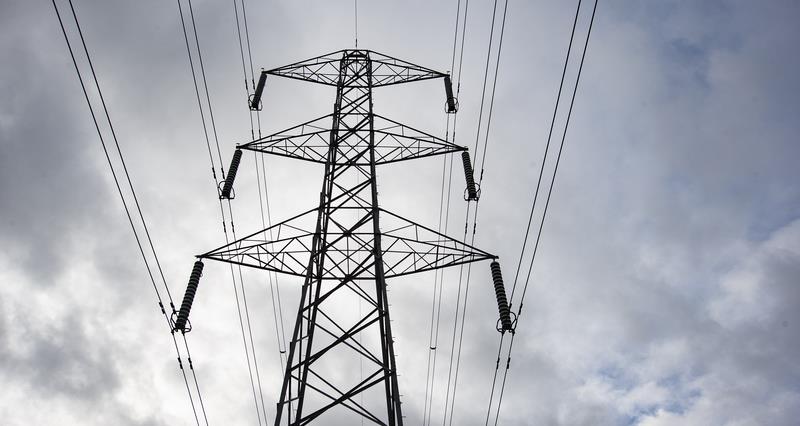The recently published letter from Nick Winser, the Electricity Networks Commissioner, to the Secretary of State outlines several recommendations for accelerating the deployment of strategic electricity transmission infrastructure that may have important implications for farmers and landowners.
The government is looking at the rollout of new infrastructure as part of ambitious proposals to connect electricity being produced from offshore wind projects and solar farms. This means either upgrading existing infrastructure or building a new national transmission network.
The plans as announced could result in miles of pylons and overhead cables being installed across thousands of acres of land, impacting food production and the landscape.
The NFU is also calling on government to move the network offshore as much as possible in order to avoid disruption to food producers.
Impact on farmers and landowners
The letter highlights how speeding up the delivery of strategic transmission is both vital and challenging with government targets to deliver 50 GW of wind power and 24 GW of new nuclear power.
Very few transmission circuits have been built in the last 30 years, and it states that a dramatic increase will be needed through to 2050. Presently it is possible to build wind generation faster than associated connections and transmission.
The letter outlines several issues with the current system, with the accompanying report highlighting how they plan to amend this system to reduce the time it takes to deliver infrastructure projects, and what action would need to be taken.
The NFU acknowledges the enormous challenge the government faces in building a transmission network to meet its targets, however it is essential that farmers and landowners’ interests are not negatively impacted by these proposed recommendations.
“If infrastructure is to be delivered quickly onshore, it’s vital that Transmission Owners, especially the National Grid, fully consult with those farmers affected.”
NFU Vice President David Exwood
NFU Vice President David Exwood said: “British farm businesses have a big part to play in helping to deliver renewable electricity, something which is a key pillar of our net zero ambition.
“However, as we know all too well, national infrastructure projects can cause huge disruption to day-to-day farming operations and last for many years.
“For example, pylons and overhead cables can be very dangerous in the vicinity of working agricultural machinery due to concerns over height.
The proposals explained
The UK’s Electricity Networks Commissioner, Nick Winser, was appointed in July 2022 as an independent advisor to government. Accompanied by the ESC (Energy Systems Catapult) report, these recommendations set the stage for the future of electricity transmission infrastructure in the UK, and outline the aim to halve the time for delivery of projects from fourteen to seven years.
Nick Winser's letter and the ESC report present a substantial change for the future of electricity transmission infrastructure in the UK. Our expert team has broken down the issues most relevant to farmers and landowners below.
Infrastructure Placement Guidelines
Nick Winser's letter underscores the lack of agreed and public guidance on the installation of transmission lines. It points out that there is no clear guidance on whether lines should be onshore or offshore, overhead, or underground, or whether lattice pylons or novel designs should be used. This lack of clarity is of particular concern to farmers and landowners who will bear the brunt of infrastructure developments on their land.
The accompanying ESC report calls for the development of ETDP (Electricity Transmission Design Principles) to provide enhanced guidance on where underground and offshore routes would be appropriate, while presuming that overhead line would be prioritised for most of the route.
While the report acknowledges that offshore or underground cables are more expensive than overhead lines, the NFU is asking for a "properly coordinated offshore network; this is where energy is created, and only when needed would the electric come on to land with overhead lines or underground cables," NFU Vice President David Exwood explained.
Clear, public guidelines would empower landowners to accurately question and understand the implications of proposed schemes.
The report further discusses engagement with communities, with recommendations that engagement should focus on issues that communities can influence, such as tower design or precise route design. The NFU supports greater control for farmers and landowners impacted by infrastructure projects on these vital aspects. However, this recommendation also outlines that community objections could be overruled by the Planning Inspectorate, who would have to make a decision based on the trade off between local and national interests.
Community benefit
“Importantly, we also need to know whether farmers will be fairly compensated and, as the recent Winser Report suggests, receive lump sum payments like individual households for hosting new infrastructure on their land,” said David.
The Winser letter highlights the absence of agreed and public rules on community benefit, resulting in affected individuals and communities facing infrastructure proposals that could negatively impact their lives. Recommendation 13 in the letter emphasises the need for community benefit guidelines, suggesting lump sum payments for affected households and the establishment of a community fund.
This is further addressed in the accompanying ESC report, which provides some further details on how Transmission Owners should provide community benefits and direct payments to residents close to new overhead lines or other visible infrastructure.
Although further detail is needed on how this could work, there could be a positive impact for farmers and landowners, as they could receive enhanced financial benefits for hosting such infrastructure. However, the report does not specifically address how landowners and farmers should receive benefits over and above basic compensation, and further clarification would be welcomed.
Land access
While not addressed in the letter from Nick Winser, the accompanying ESC report addresses TOs' (Transmission Operators) ability to access land for surveys. The report recommends TOs should be given statutory powers to access land when voluntary access has not been given.
The NFU believe this is unnecessary, as National Grid (the main Transmission Operator) already has powers under Section 172 under the Housing and Planning Act 2016 which grants access rights to ‘acquiring authorities’ to enter and undertake surveys on only 14 days’ notice.
It is only when access is refused after a notice has been served that the TOs would have to obtain a warrant. The NFU is not aware of TOs having to obtain many warrants on schemes to gain access. If negotiations are carried out and the correct payments offered for the types of surveys being carried out, it is the NFU's experience that landowners and farmers will give access for surveys to be carried out.
Wayleaves and land purchase
The ESC report also provides recommendations for changes to how wayleaves and land purchases are dealt with. It is proposed that compensation for wayleaves and purchase of land should be set at a national level, with a transparent methodology.
This needs further consideration and consultation as how compensation should be calculated is already set out under the Electricity Act. Land value will differ across the country and wayleaves must be paid to compensate landowners and farmers for the interference caused to agricultural operations.
Other changes to the wayleave and land purchase process are also recommended in the report. These include exploring how to set timeframes for compulsory purchase and necessary wayleave process, the introduction of a variation process to allow for small changes from the original land purchase or wayleave, and how these processes sit alongside planning approval.
The NFU recognises the significance of these recommendations for the agricultural community and landowners who will be directly impacted by the development of transmission networks.
While the proposed recommendations from both the Winser letter and the ESC report offer a framework to streamline and expedite the process, it is important that the interests of farmers and landowners are adequately protected.
If you have any further questions or thoughts on the announced recommendations, please contact the Infrastructure Team at infrastructure@nfu.org.uk

